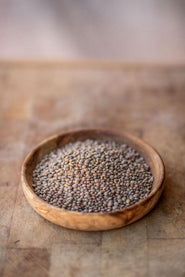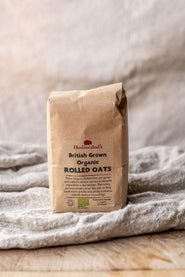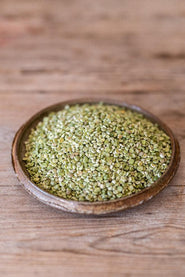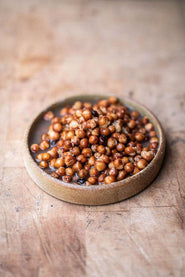Diversity is the keystone of a diet that leaves you brimming with wellbeing and balance. We all know that packing in the colourful veg is crucial, and of course cooking with great meat, just perhaps in smaller portions than the nation has eaten historically. But have you pondered on that third space on your plate? You know, the place where traditionally there might be a pile of mash or rice? Or maybe you want a balanced bowl with protein from something other than meat? Enter our new collection of sustainably farmed, homegrown grains and pulses. The wholegrain, unprocessed nature of these beauties brings bags of fibre and nutrition to the table as well as mixing up your weekly menu, but there is so much more to celebrate about this unloved culinary corner.
Forgotten Foods Minus the Food Miles
We’ve curated a selection of what we consider truly beautiful forgotten foods, all grown here in the UK. Some are crops that used to be relatively commonplace in our fields, such as the fava bean, while others have an emphasis on being homegrown alternatives to imported staples like the chickpea. Many of them are ancient species which fell from favour as easier-to-grow alternatives such as wheat and barley dominated British agriculture. Anything that makes for a more diverse farm gets our vote, as mixing up your crops boosts biodiversity too so this new collection is win-win for us and wildlife.
The Secret Soil Magic of Pulses
Pulses have a superpower; they take nitrogen (one of the crucial building blocks of plants) from the air, whereas other plants can only access what nitrogen is present in the soil. This means they don’t compete with other plants for this leaf-unfurling nutrient, and they also make what they don’t need themselves available for other crops to use. Cereals grown after a pulse crop on average yield 1.5 more tonnes per hectare, through the brilliance of this natural soil fertility rather than by throwing on kilos of artificial fertiliser, with all the environmental impact they bring. How do they do this? Pulses are the seeds of “leguminous” plants; this botanical family have small bumps all over their roots that house a special relationship where the magic happens. A certain genus of bacteria “fixes” nitrogen from the air and makes it available to the plant, while the plant provides sugars for the bacteria to survive. This poetic symbiotic relationship has massive potential for helping the planet, reducing reliance on artificial fertilisers and producing a protein-packed food.

Protein with Provenance
There’s no doubt about it, pulses and beans are a great way of pimping what’s on your plate. Whether you’re pairing them with a little meat, cooking in stocks and broths or piling them up on a meat-free Monday, they make eating less meat a breeze as they are just so interesting to cook with and feast on. We’ve chosen a glorious olive green lentil, grown in Hertfordshire on Partridge Farm. Salads, stews soups and curries all get an upgrade with this rich textured, easy cooking addition that needs no soaking. We also have a cracking batch of British-grown chickpeas, from Norfolk farmer Henry Raker, who has successfully grown the UK’s first field-scale crop of the much-loved pulse.

Carlin Pea Calling
Meanwhile we’d like you to meet the lovely Carlin Pea. Also known as black badger peas, pigeon peas and maple peas, they have a place in our agricultural history, having been grown in this country as far back as the 1600s. They are particularly beloved in the counties of Lancashire and Yorkshire, where they were traditionally boiled up and served with salt and vinegar (and perhaps a tot of rum!), especially on Bonfire night. They do need an overnight soak, or can be fast-boiled for an hour so they are an ingredient that calls for a little planning, but you’ll be rewarded with a nutty, rich-textured and flavourful addition to your meal. They work in pretty much anything you would usually use a chickpea, be that curries, salads or stews, and they are all homegrown by Mark Lea on Greenacres Farm in Shropshire. Just don’t add salt to the water while they are cooking as this can toughen the outer shell of the peas.

Carbs with Character
It’s not just homegrown pulses that deserve attention. Changing up your carb is a brilliant way of reinvigorating your cooking. It can lead you to new recipes and flavours, and rings in the changes in texture and bite. Try a delicate white quinoa that has a nutty note and is wonderfully light. You can switch it in anywhere you normally use rice or couscous, or in salads. Biologically speaking they are actually seeds, and during cooking they unfurl into elegant little spirals that are wonderful carriers of flavour, with a pleasing texture. You can even use it in place of porridge! On that oat-y note, we’ve also added some beautifully simple organic porridge oats to the collection too. They are lightly rolled and steel cut so that they cook quickly – try them in this unusual savoury porridge – think of it as a homegrown risotto!

The Hodmedod Story
So where are all these glorious homegrown goodies coming from? Nick Saltmarsh, Josiah Meldrum and William Hudson founded Hodmedod in 2012 with a mission in mind, a dedication to supplying beans, peas, grains and seeds from British farms.
With a big dream and humble beginnings the team founded Hodmedod following the successful Great British Beans trial project (set up to stimulate and assess demand for indigenous pulses). For the trial project they bought a tonne of British-grown split fava beans, packed them up at the kitchen table, and distributed them through community groups and local shops. Each pack contained a postcard with a short questionnaire on the back to collect feedback on the beans. The response to the beans was overwhelmingly positive and the rest is history.
Hodmedods are one of our farming heroes. With their in depth knowledge of indigenous species, passion for sustainable crop rotation and commitment to soil health, they are a real inspiration and a gem in the British farming landscape. A deserved winner of the BBC Radio 4 Food & Farming awards Best Producer and we're delighted to be working with them
Shop our new grains and pulses collection here.







